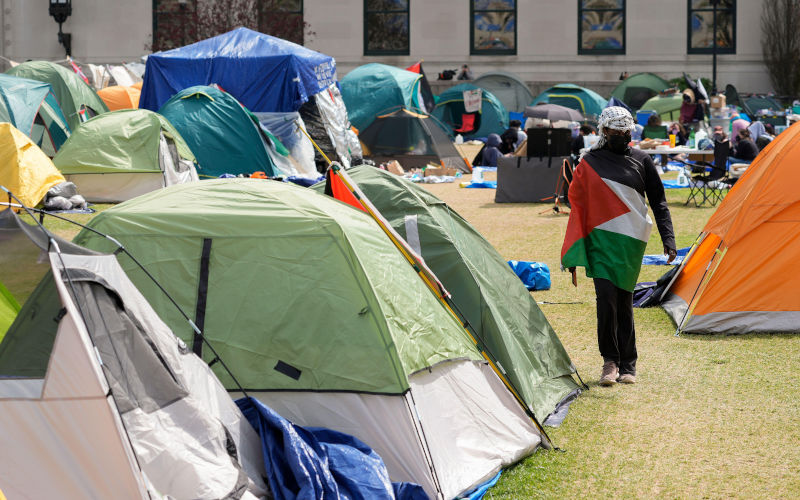Don't talk or write about Palestine. It's a career killer
June 27, 2025
The new McCarthyism sweeps through the university sector at a terrifying pace. At the core is conflation of antisemitism with criticism of Israel, spurred on by the pro-Israel lobby that has convinced or recruited governments and large sections of the media.
The moral panic that ensues is not idiosyncratic, but represents a pattern: the legislative, juridical and enforcement workings of the state being co-opted by powerful interests into an authoritarian crackdown, rationalised and sustained by fearmongering. This has led to a raft of dubious inquiries and investigations that have amplified public worry over the exaggerated and often invented “antisemitism”, resulting in policies and practices that dangerously erode free speech. In doing so, other forms of racism, including Islamophobia, that evidence shows is rife, are often ignored.
The 2025 student-led People’s Inquiry into Campus Free Speech on Palestine is supported by activists, academics and lawyers. Through submissions and public hearings, it aims to investigate freedom of speech as it relates to Palestine across university campuses. It challenges the dominant narratives that there is an antisemitism crisis in Australia universities and that Jewish students and staff are “unsafe” and has exposed troubling practices in these institutions in reaction to the moral panic. This reaction, shamefully, has silenced legitimate voices with many academics and students self-censoring for fear of repercussions.
Resistance to university repression has a professional and emotional toll. The Murdoch media has been unforgiving in naming and shaming those who stand up for the human rights of the people of Gaza. There has been a concerted push for universities to adopt either the International Holocaust Remembrance Alliance definition of antisemitism or the more recent one from Universities Australia.
The just-released preliminary report of the Inquiry provides a snapshot from among the 32 submissions received from across the sector, revealing the unjustified restrictions on academic freedom, free speech and the right to peaceful protest that have produced a pervasive climate of fear on campuses across the country and highlighting that suppression of speech on Palestine is widespread, systematic and intentional.
What we heard
Submissions provide examples of events and activities involving credible speakers and legitimate actions that were banned. At one institution, when organisers compromised with the suggestion of a virtual event, they were prohibited from using the university’s zoom account. Even benign events, such as a bake sale, have been disallowed. Despite the unconscionable collusion of universities in weapons manufacture for Israel, we heard that exposing the complicity through protest was barred at one university. Submitters spoke of universities using existing policies and devising new policies in an opaque manner to target and shut down students and staff expressing support for Palestine and opposing the genocide.
The title of this piece, from a submission, is indicative of the fear that careers of those speaking out will be in danger. Surveillance and control are an illegitimate abuse of privacy. We heard of the monitoring of classes through recordings, the use of wi-fi technology, tracking of social media accounts and prosecution and suspension of students involved in demonstrations. One disheartening submission was from a lawyer who spoke of the impact on students seeking asylum who have been subject to punitive measures and visa cancellation, surpassing repression in the countries from which they fled.
The use of certain terminology is not only questioned, but denied, including prohibitions on chanting such slogans as “From the River to the Sea, Palestine Will be Free”. Palestine symbols have become contentious, including the wearing of keffiyehs and watermelon adornments.
These restrictions raise questions about the moral compass of universities and their commitment to critical inquiry. They negate expertise within the sector by not speaking vocally about the atrocities in Gaza and are thereby complicit in their silence.
What comes now
The People’s Inquiry gives voice to those whose viewpoints have been vindicated, yet subject to suppression in a climate of fear intentionally created by university administrations to shut down ethical and bold voices. Having received sufficient prima facie evidence of serious breaches of freedom of speech and academic freedom on Australian university campuses in relation to the question of Palestine, the People’s Inquiry will proceed to the second stage of public hearings and preparation of a final report that will analyse all submissions and public hearings from the deliberations of the people.
There is a bitter irony in the fact that, as governments around the world are finally starting to condemn the brutal war on Gaza, alongside a chorus of rebuke from human rights bodies and the United Nations, universities are not among them. University staff and students are dealing with serious consequences for saying things that are now commonplace to hear. It is chilling that the once revered tenets of freedom of speech and academic freedom are being trashed by universities that are more concerned with reputational damage and appeasement with the pro-Israel lobby than with human rights and humanity.
The preliminary report is available here.
The views expressed in this article may or may not reflect those of Pearls and Irritations.

